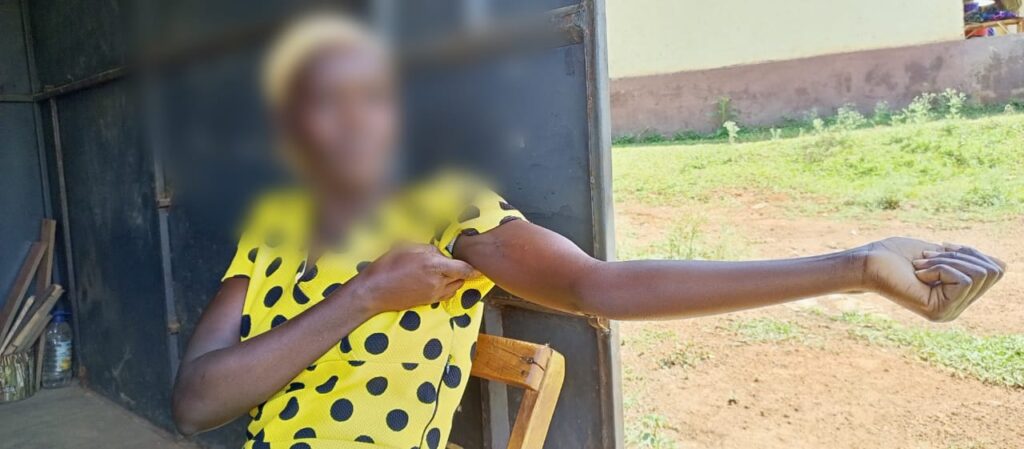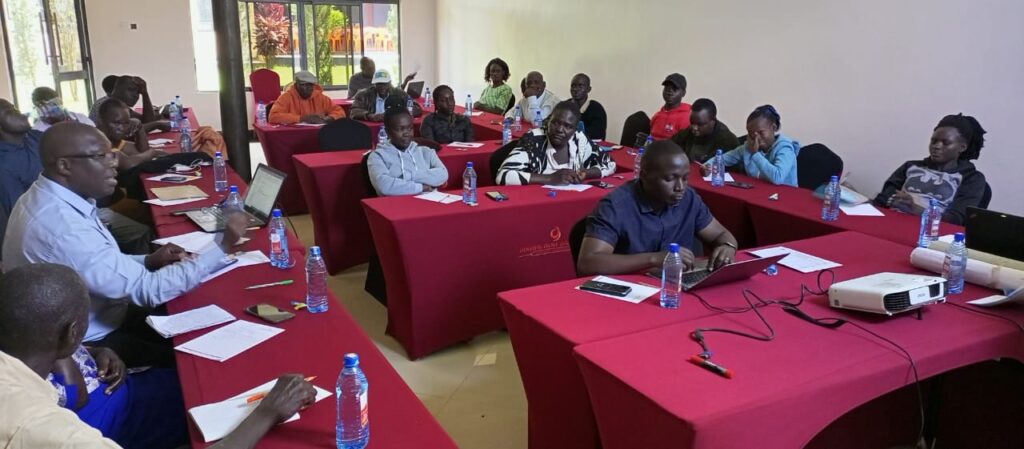On April 18, 2021, Jannet (not her real name) walked into Ukwala Sub County Hospital.
A resident of Doho East, Ukwala, had gone to deliver her third born child.
After a couple of hours in the hands of what she described as ‘uncaring’ nurses, she safely delivered.
“I had pushed for long, and I had no more strength but the nurses sat and watched as they told me ‘we have seen a lot of such’. I was helped by cleaners,” said Jannet.
But all her joy was that she still had her life spared, and that of her baby.
I think it was not well placed, and the nurses reluctantly asked me to pay Sh100 before it could be changed. My sister paid for me, as I had no money
Jannet
She was soon introduced into family planning, as she indicated, was the case with mothers delivering at the place.
Weeks later, the pain from the implant was unbearable, and she went back to the hospital to have it checked.
“I think it was not well placed, and the nurses reluctantly asked me to pay Sh100 before it could be changed. My sister paid for me, as I had no money,” she said.
But few weeks again, she could not bear the pain, and the never healing wound at the new spot where the implant was placed.
Health workers attitude

When she returned to the hospital, she was told to ‘go back home and continue monitoring’ as the pain would go away.
The pain did not go away, and when she returned to the hospital a few weeks later, she got the same response.
The frustrated Jannet returned home, and used other means to remove the implant from her arm.
“I survive on menial jobs, and I could not do anything as my hand was so painful. It looked like it was getting paralyzed,” she said.
Jannet’s testimony was one of the couple of complaints against the health facility.
Maternal mortality
Janne’s case was similar to that of Mary (also not her real name).
Sometime in 2017, she had gone to deliver at Ukwala Sub County Hospital.
She had been attending antenatal care at a hospital in Western Kenya, but forgot to carry her clinic visit records when she relocated to Ukwala.
“The arrogant nurses begun shouting at me when I could not answer some of their many questions. Remember it was my first ever delivery, so I didn’t understand much,” she said.
She said she had to move to a nearby hospital for delivery.

But she later returned to Ukwala for family planning consultation, where she was enrolled for an implant.
“I was not taken through what it all meant and any side effects to watch,” she said.
She noted that when she experienced excessive menses, she went back to the hospital, but was turned away, forcing her to seek help from another hospital in Kisumu where the implant was removed.
It was however a different case for Joyce (not her real name) when she lost her sister in 2020.
According to Joyce, her sister had had two cesarean section deliveries before, and when she was sure she would face the knife again for her third born.
“From 1am, the family was kept off, especially after we complained that the patient was not being attended to, despite pleas that she was in deep pain. It was at 12noon the following day that we were allowed to get in and see her lifeless body,” said resident of Ng’onglo Simur in Ukwala.
Intervention
The complaints were recorded following a project titled ‘Citizen Voices for Improved Health Service Delivery in Siaya.’
The project funded by Act, Change, Transform (ACT) through Tulinde Ugatuzi program saw communities scoring service delivery at Ukwala and Madiany Sub County Hospitals in Ugenya and Rarieda Sub Counties respectively.
Ten Community Based Organizations drawn from Siaya County participated in the implementation of the project led by Community Initiative Action Group (CIAG).

The groups included; Tembea Kenya, Siaya County Support and Accountability Program (SCOSAP), Imani Community Development Program (ICDEP), Siaya Muungano Network (SIMUN) and Transparency International (TI-Kenya).
Others were; Ugunja Development Initiative (UDI), SIAYA Disabled Peoples Organization (SIDIPO), Young Women Christian Association (YWCA), Institute for Law and Environmental Governance (ILEG) and Voluntary Service Overseas (VSO).
The project saw the implementing partners develop a tool which was used to score the performance of the hospitals in four main areas; service delivery, governance and management, accountability and transparency, and infrastructure.
Health workers at the hospital, and the community benefiting from their services separately made their scores.
A meeting between the two groups would then be facilitated by the project implementers to a common meeting and discuss the various scores.
Light at the end of the tunnel
According to the latest report of the scores, maternal health recorded a huge improvement, with up to 80 per cent approval by the community.
When Lake Region Bulletin attended one of the engagement sessions between the two groups, a sense of cordial relationship was visible.
Jannet was one of the attendees of the engagement, admitting that the program had actually changed her perception against the facility.
For instance, the community awarded the facility 80 per cent approval of mother to child services, five points above what the facility awarded itself.
The community also awarded the facility an approval rate of 70 per cent, five below what the facility awarded.
On maternity care, the two groups awarded 60 per cent approval rate, with a major gap only noted on approval rate of ambulance services in which the community awarded 10 per cent against the facility’s 90 per cent.
With access to information, the community is able to demand for their rights, and put the service providers to account
Chris Owala
The hospital however scored poorly on youth friendly services, at zero per cent, with the community and the health facility admitting that there was no youth friendly section to handle sexual and reproductive health.
“Those who scored zero indicated that there is no condom dispenser in the facility, nor a segment to handle the youth,” read the report in part.
Chris Owala, Director CIAG noted that with the engagement, the community is able to understand their health rights as well as operation procedures to ensure that they get their rights.
“With access to information, the community is able to demand for their rights, and put the service providers to account,” he said.
The service evaluation engagement enables the community to share their health concerns, while also giving the facility an opportunity to engage with the aim of bettering their services.
Once the issues have been pointed out, the two groups agree on timelines to provide solutions.
Challenges facing health facilities
Argwings Omondi, Ukwala Hospital Administrator noted that some of the concerns raised by the community require a lot of time to sort out, due to the bureaucracy involved.
Despite not pointing out the specific complaints by the community, Omondi noted that with the scorecard, many of the issues were being arrested.
For instance, shortage of staff, lack of power backup, lack of hospital board were some of the issues which came up.
“As a hospital, we are not involved in the establishment of the board. We only come into contact with them once they report to work after gazettement,” he said.
“For the issues which require the intervention of the top leadership of the County Government, we share with them the reports, and give the community a platform to engage them,” added Owala.
The scorecard also targeted the attitude of health workers at the facility, as well as availability of drugs, competency of staff, and involvement of the community in the management and operations of the facility.
“We continue to urge the community to report to us any concerns, including corruption, and we have punished some staffs engaged in such,” added Omondi.
Evaluation is part of growth, and if it is done in a structured way, then it is a source of great learning
Dr Juliana Otieno
Dr Juliana Otieno, former CEO of Jaramogi Oginga Odinga Teaching and Referral Hospital (JOOTRH) said such evaluation initiatives have seen improvement of health services both locally and internationally.
“Evaluation is part of growth, and if it is done in a structured way, then it is a source of great learning,” said the Pediatrician.
She said through the engagements, both the facility and the community are able to have a common understanding, and pull together in a bid to improve health services.
She said NHIF has been using similar methods to evaluate the health systems in the county, and that implementers of the Ukwala Hospital Scorecard Project may bring them on board.
“The project however requires money, and it must be clear how it is funded,” she added.

[…] County is among the 15 counties in Kenya grappling with the issue of maternal deaths, with PPH among the leading direct cause of these […]
[…] County is among the 15 counties in Kenya grappling with the issue of maternal deaths, with PPH among the leading direct cause of these […]